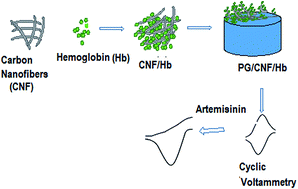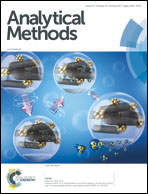Electrochemical catalysis of artemisinin on hemoglobin functionalized carbon nanofibers
Abstract
Artemisinin (ART) is a sesquiterpene lactone and a popular malaria drug used in the Asian subcontinent and some parts of Africa. Understanding the mechanism of action of this drug is important, given recent reports of emergence of resistance of malaria to ARTs. We have investigated biocatalytic reduction of ART on hemoglobin anchored on carbon nanofibers using electrochemistry. We have also investigated the drug interaction with hemoglobin in free solution using liquid chromatography and UV-visible spectroscopy. Using electrochemistry, linear relationships between the catalytic peak current and the ART concentration was observed. The linear range was from 0 to 200 μM and with 0.329 mA mM−1 sensitivity. The calculated apparent Michaelis–Menten constant Km for hemoglobin anchored on carbon nanofibers towards catalysis of ART was 0.093 mM. The analysis of free hemoglobin reacted with ART monitored using UV-visible spectroscopy and liquid chromatography indicated formation of adducts.



 Please wait while we load your content...
Please wait while we load your content...